Contact: +91 99725 24322 |
Menu
Menu
Quick summary: Uncover the essential steps to ensure compliance with the European Union Deforestation Regulation (EUDR) in our latest blog. From understanding regulatory requirements to implementing effective strategies, discover how to navigate the complexities of EUDR with confidence.

From crafting robust policies to embracing sustainable supply chain practices, businesses need to gear up for EUDR compliance fostering a more sustainable and ethical future. In the face of escalating environmental concerns, the European Union is gearing up to implement a groundbreaking regulation aimed at curbing deforestation.
The impending EU Deforestation Regulation (EUDR) targets key commodities such as cattle, cocoa, coffee, palm oil, rubber, soy, and wood, with the goal of eliminating products associated with deforestation or forest degradation from the EU market. To assist companies in navigating this regulatory landscape, we present a comprehensive guide outlining five crucial steps for preparation, utilizing the Accountability Frameworks Initiative.
Prepare for a paradigm shift in how the EU interacts with deforestation – the EU Deforestation Regulation (EUDR) is here! This groundbreaking legislation stands as a global frontrunner in the fight against deforestation, promising transformative consequences for businesses and consumers alike.
At its core, EUDR aims to eliminate deforestation from supply chains of seven key commodities:
EUDR sets strict criteria for businesses placing these commodities on the EU market:
These requirements are no light matter, with potential consequences for non-compliance:
In essence, EUDR demands a fundamental shift in how businesses approach sourcing and supply chain management. It’s a wake-up call for industry to embrace sustainable practices and prioritize forest protection.
Stay compliant and unlock opportunities in sustainable sourcing with ease.
Navigate the European Union Deforestation Regulation (EUDR) effortlessly.
Imagine a world where your purchases empower positive change, where every product whispers a story of ethical sourcing and environmental responsibility. The Accountability Framework Initiative (AFi) is a collaborative force championing just that!
The cornerstone of AFi’s work is the Accountability Framework itself. This consensus-based document, meticulously crafted through open dialogue and collaboration, serves as a practical roadmap for navigating the complexities of ethical sourcing. It delves into:
The significance of AFi’s consensus-based approach is paramount:
AFi is not just a framework; it’s a movement. It’s a catalyst for change, empowering businesses to source responsibly, protect the environment, and uphold human rights. By choosing AFi-aligned companies and products, you become an active participant in this movement, building a more sustainable and equitable future, one purchase at a time.
In the turbulent waters of global trade, the Accountability Framework (AF) emerges as a guiding lighthouse, illuminating the path towards responsible and sustainable supply chains. For companies navigating the complexities of ethical sourcing, the Framework offers a practical roadmap, a compass amidst the uncertainty.
Leveraging the AFi’s tools empowers companies to:
The AFi is not a mere compliance checklist; it’s a transformative opportunity. By adopting its principles and tools, companies can embark on a journey towards responsible sourcing, building resilient supply chains and contributing to a more sustainable future.
The EU Deforestation Regulation (EUDR) looms large, casting a spotlight on how businesses manage their supply chains. Companies trading in key commodities like soy, beef, and palm oil must now prioritize not just profit, but planet and people. To navigate this new landscape and achieve EUDR compliance, the Accountability Framework (AFi) emerges as a powerful ally.
Learn why traceability matters and how it can revolutionize your business.
Unlock the secrets of supply chain traceability in commodity supply chains
Let’s dive into the five key areas where AFi’s guidance shines brightest, paving the way for responsible sourcing and robust EUDR preparation:
As the EU Deforestation Regulation (EUDR) casts its shadow on the horizon, clear company policies become the bedrock of a successful navigation. With the Accountability Framework (AFi) as your compass, crafting robust policies ensures not only EUDR compliance but also a commitment to ethical sourcing and environmental responsibility.
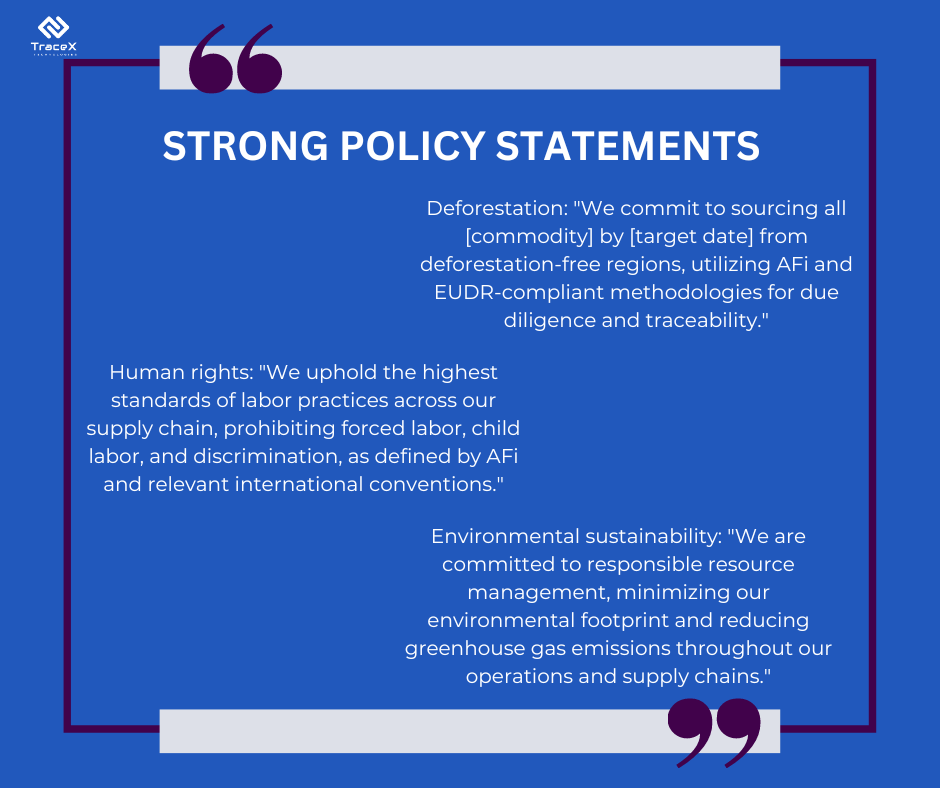
Crafting clear, AFi-aligned policies is not just about ticking compliance boxes. It’s about embracing an ethical sourcing ethos and actively driving positive change. Remember, your policies are a living document, a promise to your stakeholders and a commitment to your future.
Company policies set the north star, guiding your ethical sourcing journey. But to navigate the complex terrain of deforestation and human rights challenges, you need a sturdy vessel – a robust management system.
Why are sound management systems so essential?
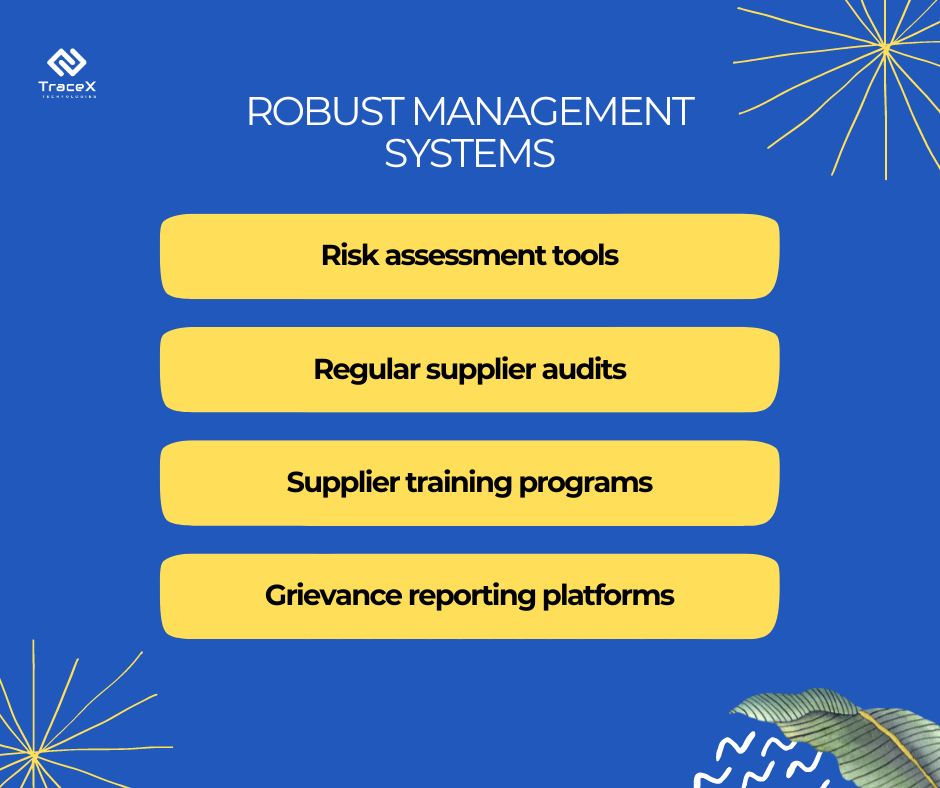
With a robust AFi-driven management system, you’re not just ticking compliance boxes; you’re building a resilient and responsible supply chain, creating a future where ethical sourcing is not just a goal, but the very fabric of your business.
The EU Deforestation Regulation (EUDR) casts a spotlight on the origins of commodities, demanding transparency and accountability from businesses. Verifying where every bean, every tree, and every drop of oil comes from is no longer optional; it’s the key to market access and a sustainable future. This is where effective supply chain mapping and traceability become your guiding compass, and the Accountability Framework (AFi) emerges as your trusty map.
Why are supply chain mapping and traceability so crucial for EUDR compliance?
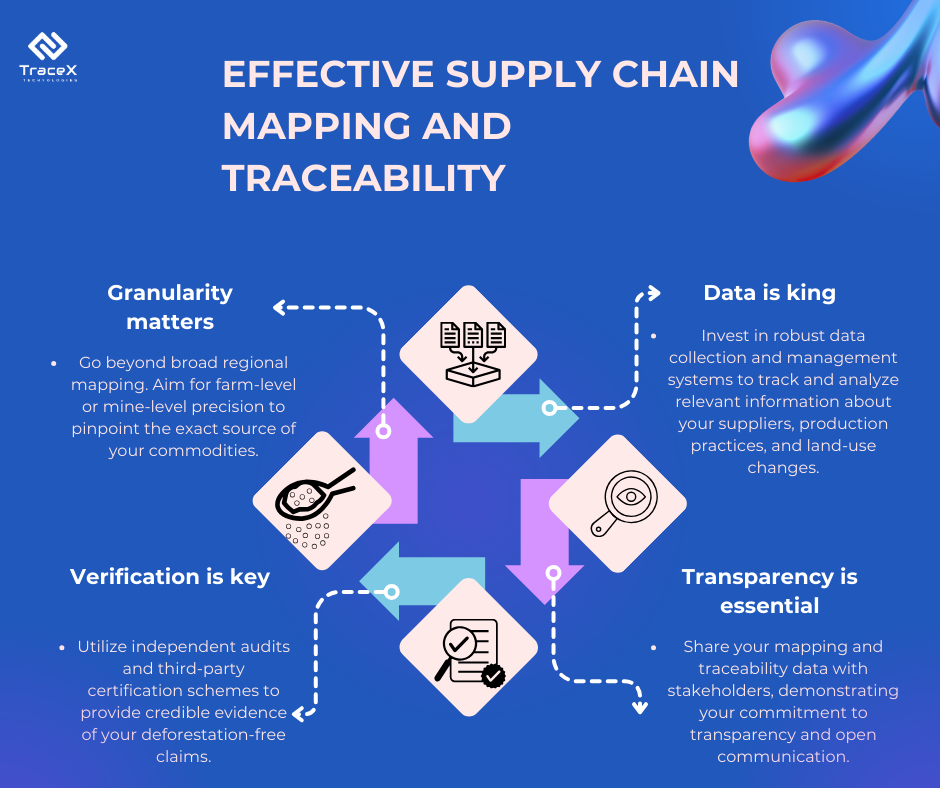
Remember, EUDR compliance is not just a checkbox exercise; it’s an opportunity to transform your business. By embracing AFi’s guidance and investing in effective supply chain mapping and traceability, you can navigate the EUDR landscape with confidence, build trust with stakeholders, and lead the way towards a more sustainable and ethical future.
The journey towards ethical sourcing and EUDR compliance is not a solitary trek. It requires collaboration, hand in hand with suppliers of all sizes, from multinational giants to smallholder farmers. Engaging your suppliers effectively, especially smallholders, becomes the bridge connecting lofty goals to lasting impact. The Accountability Framework (AFi) offers the blueprint for building this crucial bridge.
Why is supplier engagement so critical?
Remember, supplier engagement is not a one-way street. Actively listen to your suppliers, understand their challenges, and adapt your approach to build trust and lasting partnerships.
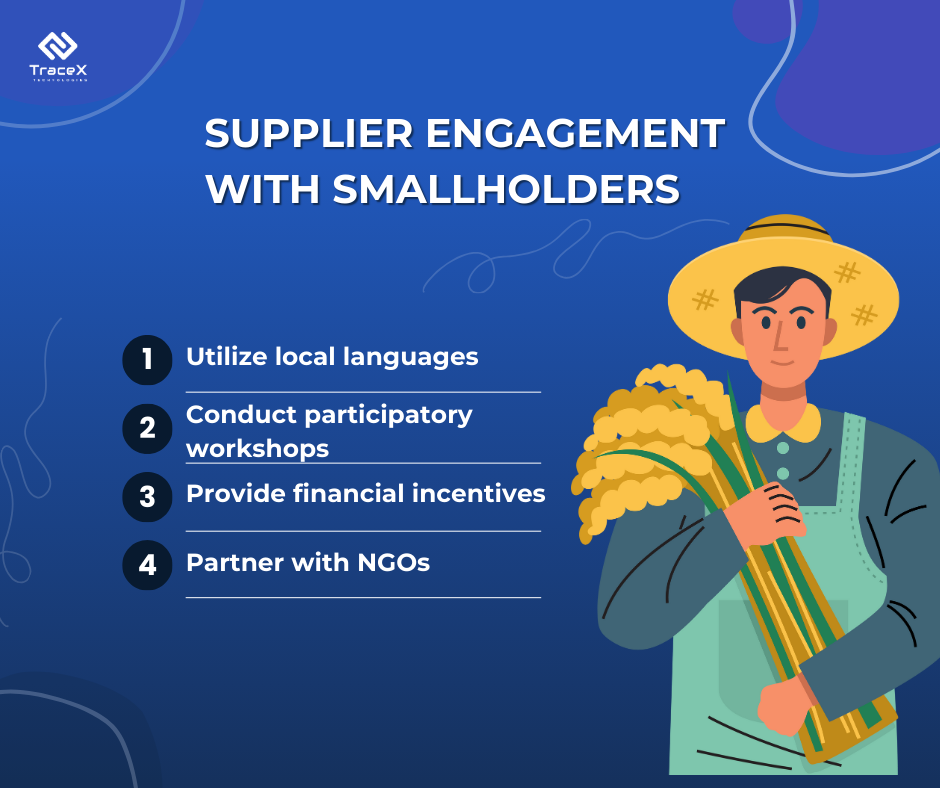
By embracing AFi’s guidance and fostering effective supplier engagement, especially with smallholders, you can transform your supply chains into beacons of ethical sourcing and environmental responsibility. You’ll not only achieve EUDR compliance, but also contribute to a future where deforestation-free products become the norm, and sustainable livelihoods thrive alongside healthy ecosystems.
The EU Deforestation Regulation (EUDR) isn’t just a box to tick; it’s a compass guiding towards a sustainable future. But without accurate data and robust monitoring systems, navigating this landscape is akin to sailing blindfolded. Enter reliable, EUDR-compliant monitoring systems, fueled by the Accountability Framework’s (AFi) actionable guidance.
Why are proper monitoring systems crucial for EUDR compliance?
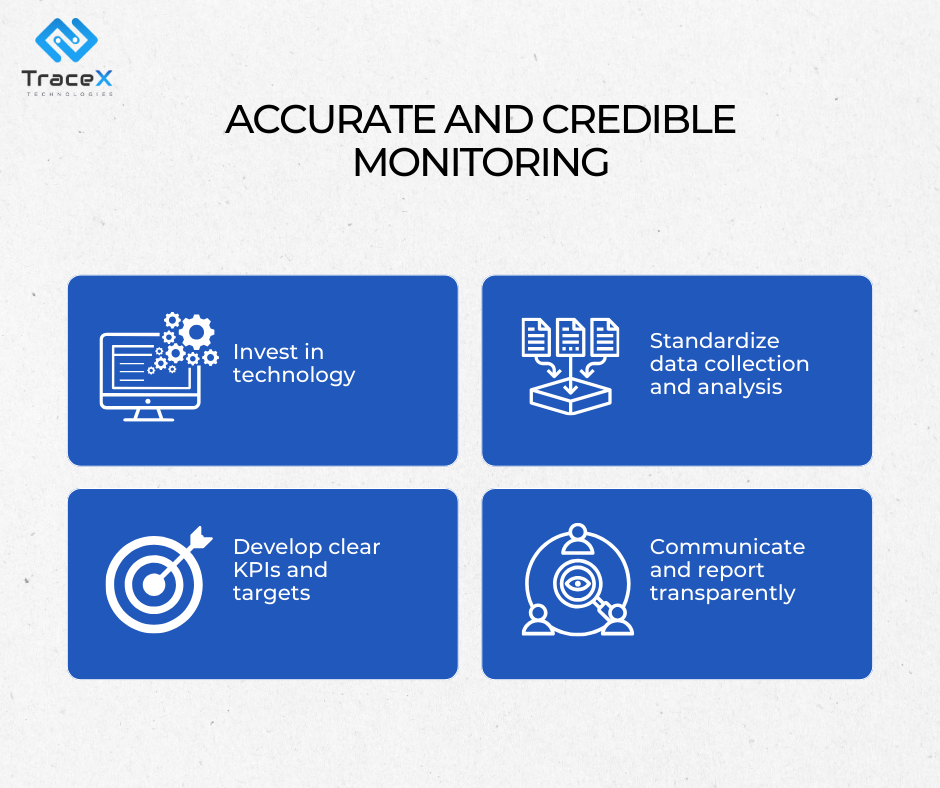
Remember, EUDR-compliant monitoring isn’t just a formality; it’s a powerful tool for driving positive change. By actively engaging with AFi’s guidance and implementing robust monitoring systems, you can not only achieve compliance but also become a leader in pushing the boundaries of sustainable sourcing and responsible business practices.
Traceability technology solutions complement AFi’s tools by providing enhanced data visibility, facilitating risk identification and mitigation, enabling policy development and implementation, and supporting progress tracking and performance monitoring in pursuit of sustainability objectives.
Traceability technology provides companies with a comprehensive view of their supply chain, allowing them to accurately identify key areas of focus in alignment with AFi’s 12 core principles. Traceability enables companies to conduct thorough risk assessments by providing insights into the origins and practices associated with their products. By tracking the journey of products and ensuring compliance with ethical and sustainability standards, companies can translate AFi’s principles into actionable steps. By capturing and analyzing data on key metrics such as deforestation rates, labor conditions, and carbon emissions, companies can measure their impact against AFi’s goals and objectives. This transparency fosters accountability and enables continuous improvement efforts to drive positive change within the supply chain.
Explore TraceX;s Supply Chain Traceability Solutions
Embracing an ethical supply chain, fuelled by the Accountability Framework (AFi), is not just about ticking EUDR compliance boxes. It’s a strategic leap towards a future where profit and purpose walk hand in hand, where your business thrives not just in spite of sustainability, but because of it. AFi is not just a framework; it’s a compass. It guides you towards not just EUDR compliance, but also towards a future where your business thrives amidst a greener, fairer, and more sustainable world.
In conclusion, navigating the complexities of the EU Deforestation Regulation (EUDR) demands a strategic and comprehensive approach. The five essential steps outlined in this blog provide a roadmap for businesses aiming not just for compliance but for sustainable and responsible practices. As the regulatory landscape evolves, embracing transparency, traceability, sustainable sourcing, and proactive engagement with stakeholders become paramount. By incorporating these steps into operational frameworks, businesses can not only meet regulatory requirements but also contribute to the broader global initiative of combating deforestation and promoting environmentally conscious practices. As the EUDR comes into effect, those who proactively implement these measures will not only secure compliance but position themselves as leaders in fostering a deforestation-free and ecologically sustainable future.
